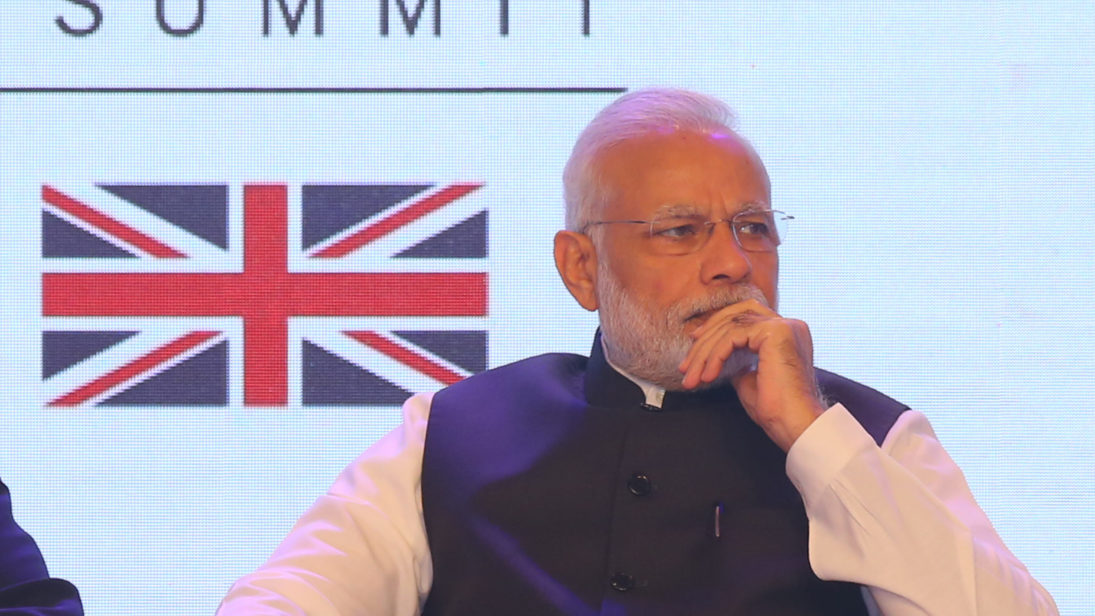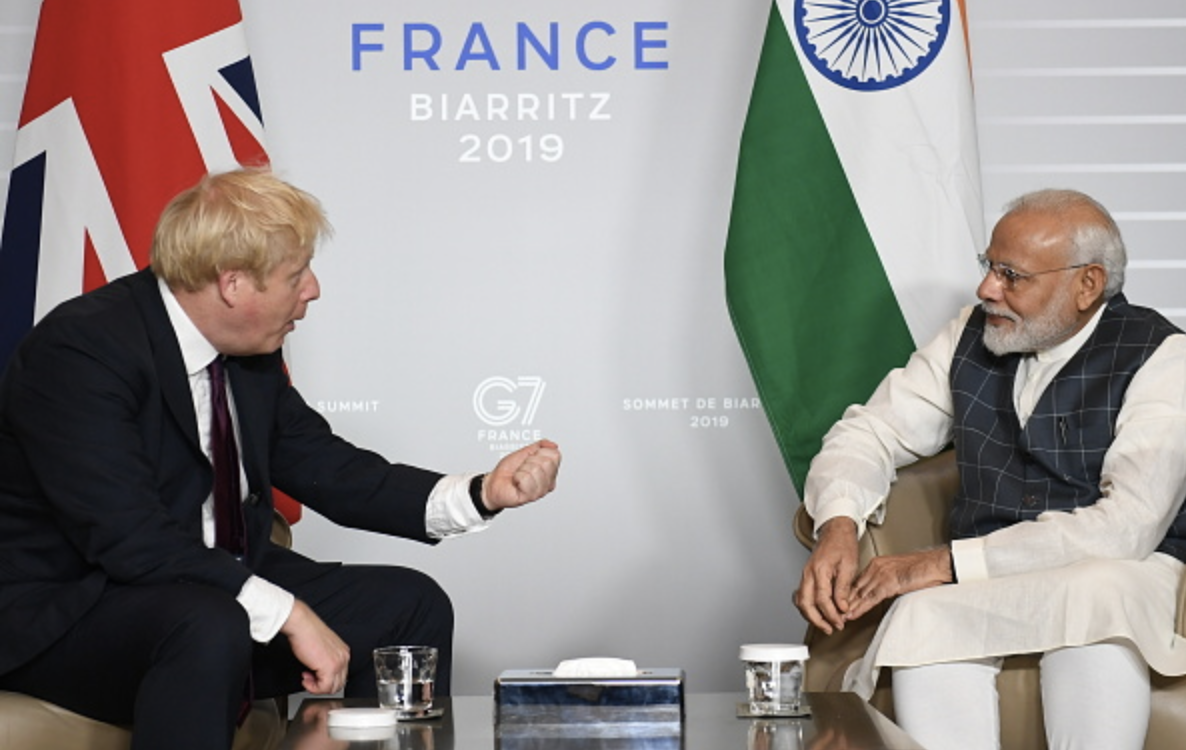
As the United Kingdom (UK) charted new and exciting relationships with global partners after leaving the European Union, British Prime Minister Boris Johnson was set to travel to New Delhi for his first official bilateral visit to the country since being elected into office.
Though now postponed due to the ongoing global pandemic, the planned visit itself represents a somewhat watershed moment in British-Indo relations, with the strengthening of political and economic ties. Johnson hailed the planned visit as a “quantum leap” in the UK’s ties with India, which was an “increasingly indispensable partner” and a “key player in the Indo-Pacific region.”
The merits of this UK-India partnership in innovation and research have already become strikingly obvious as the world begins to roll out mass vaccination programs against the COVID-19 pandemic.
A New Era for UK-India Relations
The visit was significant for another notable reason, as Indian Prime Minister Narendra Modi had invited his British counterpart to take part in the country’s annual Republic Day event, marking the anniversary of Independent India officially adopting its constitution. This was seen as a highly symbolic gesture by Prime Minister Modi, and was well received in London. India’s Republic Day invites have for long indicated the direction of New Delhi’s foreign policy. Johnson would have been the first British Prime Minister to attend the ceremony after a gap of 27 years as the two countries admittedly work on building a “new era” of UK-India ties.
It is hoped that Johnson will have a more constructive relationship with Modi than his predecessor, Theresa May. A quick win for Prime Minister Johnson will be a revision of the Indian student visa process. Relations with one of Britain’s oldest allies foundered under Prime Minister May, who as Home Secretary resisted pressure to ease visa applications for Indian students. Until recently, numbers of Indian students choosing to study at British universities had been falling significantly. Deepening collaboration under India’s newly approved National Education Policy, that aims to “internationalize” Indian higher education was also a key subject of focus during the December visit of Foreign Secretary Dominic Raab to India.
Reviewing this and altering accordingly, particularly in key areas which would enhance UK capability such as IT, will be an early test for the British Prime Minister’s new points-based visa system, and would go some way to amending long-held immigration issues with the subcontinent, not helped during Theresa May’s premiership.
The merits of this UK-India partnership in innovation and research have already become strikingly obvious as the world begins to roll out mass vaccination programs against the COVID-19 pandemic. The Serum Institute of India, the world’s largest vaccine manufacturer, will be supplying over one billion doses of the coronavirus vaccine developed by the UK’s Oxford University, together with AstraZeneca. With GAVI, the Vaccine Alliance set to procure millions of doses of this vaccine, this collaboration between the UK-India would result in providing affordable, quick, and equitable access to COVID-19 vaccines for the Global South.
This larger strengthening of political ties comes amid crucial economic developments between the two countries. It was widely believed that the January visit would have cemented an Enhanced Trade Agreement between the world’s fifth and sixth biggest economies. Last year, India became the second-largest source of foreign direct investment into the UK, while the UK remained the sixth-largest source of foreign direct investment into India, with trade between the two already worth USD $33 billion a year.

Countering Growing Chinese Influence
As much as strengthening economic ties and deeper political engagement between London and New Delhi are shaping increased engagement between the two, it is only part of a broader strategic shift which will see both the UK and India at the center of the world’s democracies to counter growing Chinese influence and revisionism across the globe.
While maintaining existing relations with European partners and strengthening continental security, the UK is also undertaking a geostrategic pivot to the Indo-Pacific. Seeking to unite like-minded liberal democracies in this region to help protect the rules-based order is becoming increasingly central to the Global Britain strategy, which places an emphasis on developing alliances and partnerships across this region. While the planned January visit to New Delhi was the most immediate sign of this, it was the UK’s invite to India for this summer’s G7 meeting which solidified this desire for a greater geostrategic partnership with India. Joining South Korea and Australia, it is hoped that the three will unite with the G7 in forming a group of 10 democracies—the D10.
The ability of this new political alliance to counter Chinese revisionism across the region will prove fundamental in combating some of the biggest shared challenges to these like-minded states. Protecting democratic governance structures from authoritarian aggression, while collaborating and developing a shared digital infrastructure, are two such areas of shared national interests among this group of 10.
With an increasingly positive political relationship between Prime Ministers Johnson and Modi strengthening this renewed strategic partnership, the UK and India are set to stand shoulder to shoulder in facing shared challenges together.
The Move Toward a Reimagined Future
While London is reaching out to New Delhi as a part of Global Britain’s Indo-Pacific pivot, India has also been reimagining its relationship with the UK, attempting to break away from the limitations defined by a difficult history of colonial rule and partition. Prime Minister Modi’s invitation to Prime Minister Johnson follows his “turnaround” on the Commonwealth, an organization that had for long been considered irrelevant in India. In addition, a debate has reopened within New Delhi’s policy circles about India embracing its place as a large English-speaking country within the Anglosphere—an idea that until recently had very few takers in India. This shift can be placed in the larger move away from India’s post-colonial Cold War tradition of nonalignment towards forging multiple partnerships based on an increasing convergence on geopolitical outlooks—chief among them, shared concerns regarding China.
As was seen elsewhere, 2020 dealt a severe blow to both countries’ ties with Beijing. As a result of the pandemic, and concerns surrounding Hong Kong’s National Security law and Huawei, London has now come a long way from seeking a “golden era” of Sino-British ties. Chinese attempts to alter the status-quo along the Line of Actual Control with India killed 20 Indian soldiers and possibly several Chinese soldiers, resulting in a continued stand-off in the Himalayas and dragging India-China relations to their lowest point in over 50 years.
A bold and ambitious foreign policy steeped in new trade deals is integrating Global Britain further into the Indo-Pacific, and with it, a new age of geostrategic relations with India is underway. Many in New Delhi are counting on this growing convergence of their strategic interests in the Indo-Pacific to triumph over the shadows that their colonial history continue to cast on their bilateral relations. With an increasingly positive political relationship between Prime Ministers Johnson and Modi strengthening this renewed strategic partnership, the UK and India are set to stand shoulder to shoulder in facing shared challenges together.
Editor’s Note: A version of this piece originally appeared on 9DashLine and has been republished with permission from the editors.
DISCLAIMER: All views expressed are those of the writers and do not necessarily represent that of the 9DASHLINE.com platform.
***
Image 1: British High Commission, New Delhi via Flickr
Image 2: Pool via Getty Images


